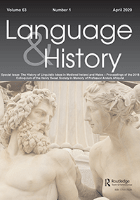
Language & History
Scope & Guideline
Advancing Understanding of Language in Historical Contexts
Introduction
Aims and Scopes
- Historical Linguistics and Language Change:
The journal investigates the historical development of languages, examining shifts in grammar, vocabulary, and usage over time, as well as the socio-political contexts that drive these changes. - Language and Society:
Research often delves into the interplay between language and societal factors, including identity, power dynamics, and cultural interactions, highlighting how language shapes and is shaped by social structures. - Educational Linguistics:
The journal covers the evolution of language teaching methodologies and their historical contexts, analyzing how educational practices influence linguistic competence and language preservation. - Philosophical and Theoretical Perspectives:
There is a strong focus on philosophical debates surrounding language, including discussions on language universals, semantic theories, and the implications of linguistic structures for thought and communication. - Multilingualism and Language Contact:
The journal explores themes related to bilingualism and multilingualism, investigating how languages influence each other through contact, colonization, and globalization, as well as their implications for identity. - Linguistic Documentation and Preservation:
Contributions often address the documentation of lesser-studied languages and dialects, emphasizing the importance of preserving linguistic diversity in the face of globalization.
Trending and Emerging
- Interdisciplinary Approaches to Language:
There is a noticeable trend towards integrating insights from various disciplines, such as sociology, anthropology, and philosophy, into linguistic studies, reflecting a holistic understanding of language in its historical context. - Language and Digital Humanities:
Emerging themes include the use of digital tools and methodologies to analyze historical texts and language data, showcasing how technology is reshaping linguistic research and historical analysis. - Sociolinguistics and Language Variation:
A growing focus on sociolinguistic aspects, such as language variation, identity, and social networks, indicates a trend towards understanding how language functions within diverse communities and historical periods. - Language Policy and Planning:
Recent articles emphasize the implications of language policy and planning in historical contexts, particularly how governance and societal structures affect language use and preservation. - Language and Memory:
The intersection of language with memory studies is gaining traction, particularly in exploring how linguistic practices shape collective memory and historical narratives.
Declining or Waning
- Prescriptive Grammar and Usage Guides:
There appears to be a reduced emphasis on prescriptive approaches to grammar, as the field increasingly values descriptive linguistics and the understanding of language as a dynamic system. - Traditional Historical Syntax:
Research specifically concentrating on traditional historical syntax has diminished, possibly due to a broader interest in sociolinguistic factors and language variation rather than prescriptive syntactic rules. - Colonial Linguistics:
While still relevant, studies strictly focused on colonial linguistic practices and their impacts are less frequent, as contemporary discussions shift towards post-colonial perspectives and the complexities of language in modern contexts. - Diaspora Studies:
The exploration of language within diaspora communities seems to have waned, potentially replaced by more integrated studies that consider the influences of globalization on language practices. - Narrowly Defined Language Families:
Research centering on very specific language families without broader contextual analysis is declining, as the journal increasingly favors interdisciplinary approaches that connect linguistic studies with historical and social frameworks.
Similar Journals
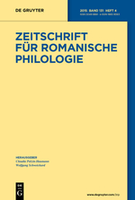
ZEITSCHRIFT FUR ROMANISCHE PHILOLOGIE
Advancing Scholarship in Linguistics and Literary TheoryZEITSCHRIFT FUR ROMANISCHE PHILOLOGIE, published by Walter de Gruyter GmbH, stands as a prominent peer-reviewed journal dedicated to the fields of Linguistics, Literature, and Literary Theory. Established in 1877 and continuing its legacy to the present day, this esteemed journal offers a platform for comprehensive scholarship that explores the intricacies of Romance languages and their literary heritage. With a notable Q1 ranking in Literature and Literary Theory and a Q2 ranking in Linguistics and Language, it has secured its place among leading resources in the humanities. Researchers, educators, and students benefit from its rich historical context and current contributions to the understanding of Romance languages and literature. Though currently not available as Open Access, the journal prioritizes the dissemination of high-quality research, making significant strides in fostering academic dialogue and advancement. Its address at Genthiner Straße 13, Berlin, Germany, situates it in a hub of scholarly activity, bridging the past with contemporary literary discourse.

Language Dynamics and Change
Fostering a Deeper Understanding of Linguistic ShiftsLanguage Dynamics and Change is a premier academic journal dedicated to exploring the evolution, variation, and transformation of languages over time. Published by BRILL, a reputable name in scholarly publishing, this journal aims to provide researchers, professionals, and students with a robust platform for disseminating cutting-edge findings in the field of linguistics. With an impressive Q1 quartile ranking in the Linguistics and Language category and a commendable ranking of #170 out of 1088 in the Arts and Humanities sector, it occupies a significant position in the academic landscape, showcasing innovative research that fosters a deeper understanding of language dynamics. Although it does not currently offer open access, the journal is committed to enhancing accessibility through various distribution channels. As we look ahead to its convergence period extending until 2024, Language Dynamics and Change continues to affirm its status as a vital resource for advancing the study of language evolution worldwide.
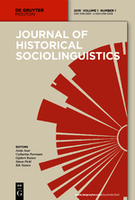
Journal of Historical Sociolinguistics
Advancing Understanding of Sociolinguistic Dynamics Across ErasThe Journal of Historical Sociolinguistics is a distinguished publication focusing on the intricate relationships between language and society from a historical perspective. Published by WALTER DE GRUYTER GMBH in Germany, this journal (ISSN: 2199-2894, E-ISSN: 2199-2908) is recognized for its rigorous scholarship, ranking in the Q2 quartile in Linguistics and Language (2023), highlighting its relevance and impact within the academic community. With Scopus rankings placing it at #326/1088 in Arts and Humanities and #386/1167 in Social Sciences, this journal is essential for researchers and scholars interested in the dynamics of language evolution, sociolinguistic shifts, and historical context. Through its insightful articles and contributions, the journal aims to illuminate the nuanced interplay between linguistic change and social factors over time, making it an invaluable resource for students, professionals, and academics alike. The journal operates under an open-access model, ensuring that knowledge is disseminated widely and freely accessible to those engaged in the cutting-edge studies of sociolinguistics.

Forma y Funcion
Illuminating the complexities of form and function in linguistics.Forma y Funcion is a distinguished open access journal published by UNIV NACIONAL COLOMBIA, FAC CIENCIAS HUMANAS, dedicated to advancing the fields of linguistics and language studies. With an ISSN of 0120-338X and an E-ISSN of 2256-5469, the journal has been committed to open access since 2005, ensuring that research is freely accessible to scholars, professionals, and students around the globe. Situated in Bogotá, Colombia, it has established itself as a pivotal platform within the academic community, achieving a commendable Q2 ranking in 2023 in the subfield of Linguistics and Language. Its Scopus rankings further underscore its relevance, placing it in the 55th percentile among peers in the Arts and Humanities and the 51st percentile within Social Sciences. Covering a range of topics related to language and linguistics, Forma y Funcion aims to foster cutting-edge research and dialogue, making significant contributions to the field from 2019 through 2024 and beyond.
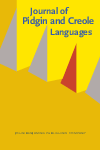
JOURNAL OF PIDGIN AND CREOLE LANGUAGES
Illuminating the Intersection of Language and SocietyJOURNAL OF PIDGIN AND CREOLE LANGUAGES, published by John Benjamins Publishing Co, is a leading international journal dedicated to the study of pidgin and creole languages, offering a unique platform for interdisciplinary research within the fields of linguistics and language studies. With an impressive impact factor reflected in its 2023 Scopus rankings—placing it in the Q2 category for both Linguistics and Language—this journal has established itself as an essential resource for academics and practitioners alike. Covering a broad temporal scope from 1986 to 2024, it promotes innovative research that advances the understanding of language evolution, socio-linguistics, and cultural dynamics. The journal’s focus on both theoretical and practical perspectives makes it particularly valuable for researchers, professionals, and students interested in the complexities of language and identity. Although it does not currently offer Open Access, its commitment to quality scholarship ensures that each issue presents cutting-edge research and critical insights into the world of pidgins and creoles.
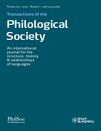
TRANSACTIONS OF THE PHILOLOGICAL SOCIETY
Bridging Theory and Practice in Language StudiesTRANSACTIONS OF THE PHILOLOGICAL SOCIETY, published by Wiley, is a prestigious journal focusing on the fields of linguistics and language studies. With a rich history that spans over 180 years, having been established in 1842, this journal continues to contribute significantly to the academic discourse on language and linguistics. It holds an impressive impact factor and ranks in the Q2 category for both Linguistics and Language in the 2023 category quartiles, underscoring its relevance and scholarly influence, as evidenced by its rankings in the Scopus database. Researchers, professionals, and students will find this journal invaluable for accessing high-quality research articles that illuminate various aspects of language and linguistics. While the journal does not currently offer open access, it remains a vital resource for anyone dedicated to advancing knowledge in these fields. Its address in the United Kingdom underscores its international reach and commitment to academic excellence.
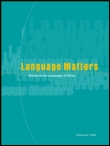
Language Matters
Transforming Perspectives on Language AcquisitionLanguage Matters is a prestigious journal dedicated to the dynamic field of Linguistics and Language, published by Routledge Journals, Taylor & Francis Ltd in the United Kingdom. With an ISSN of 1022-8195 and an E-ISSN of 1753-5395, this journal serves as an essential platform for scholars seeking to explore the multifaceted relationships between language and society. Recognized in the 2023 Category Quartiles as Q2 in Linguistics and Language, it boasts impressive Scopus rankings, sitting at #298 out of 1088 in the Arts and Humanities category and #356 out of 1167 in Social Sciences, highlighting its significant impact on the field with a 72nd and 69th percentile ranking, respectively. The journal's scope encompasses a wide range of topics including language acquisition, sociolinguistics, and psycholinguistics, making it a vital resource for researchers, educators, and students alike. By not offering open access, it maintains a curated selection of high-quality peer-reviewed articles, ensuring that academic rigor and relevance are upheld for its readership. With a publication range spanning from 1993 to 2024, Language Matters continues to shape conversations and advance knowledge in the ever-evolving landscape of linguistic research.

NEUPHILOLOGISCHE MITTEILUNGEN
Illuminating Contemporary Discussions in LanguageNEUPHILOLOGISCHE MITTEILUNGEN, published by the esteemed Modern Language Society, stands as a significant contribution to the domain of Language and Linguistics. With a history dating back to 1971, this journal has consistently provided an academic platform for researchers and scholars, navigating through the intricacies of philology and linguistic studies. Although it is indexed in Scopus with rankings reflecting its position in the Arts and Humanities and Social Sciences categories, it currently does not offer Open Access, which may require interested parties to seek institutional access for its wealth of content. The journal has experienced periods of coverage discontinuation in recent years, yet it remains a valued source for advancing the understanding of language theories and linguistic practices. Its location in Helsinki, Finland, offers a unique European perspective on global linguistic issues. The journal is ideal for those looking to engage with evolving linguistic trends and contribute to contemporary discussions in the field.

Turkic Languages
Navigating the Intricacies of Turkic Language StudiesTurkic Languages is an esteemed academic journal published by HARRASSOWITZ VERLAG, dedicated to the exploration and analysis of Turkic languages within the broader fields of linguistics and language studies. With an ISSN of 1431-4983, this journal serves as a vital platform for researchers, professionals, and students interested in the intricate structures, dynamics, and cultural contexts of Turkic languages. Although it currently operates without an Open Access option, the journal's commitment to quality research is evident in its placement within the Q4 category of Linguistics and Language for 2023, alongside its Scopus rankings where it stands in the 30th and 26th percentiles for Language and Linguistics across Arts and Humanities and Social Sciences, respectively. The journal's scope encompasses a variety of linguistic phenomena, striving to foster a deeper understanding of Turkic languages and their significance in the global linguistic landscape. With converged years from 2017 to 2022, Turkic Languages continues to uphold its reputation as a crucial resource for advancing scholarship in this specialized field.

Studii de Lingvistica
Connecting scholars through groundbreaking research.Studii de Lingvistica is a premier open-access journal committed to advancing the field of linguistics and language studies since its inception in 2011. Published by EDITURA UNIV ORADEA in Romania, this scholarly platform aims to disseminate high-quality research that encompasses various aspects of linguistics, encouraging contributions from researchers and professionals worldwide. With an impact factor that reflects its relevance, the journal holds a prestigious position in the Q2 category of Linguistics and Language for 2023. Despite its relatively nascent H-index, Studii de Lingvistica has carved a niche for itself, ranking 1017th and 1094th in Scopus across Arts and Humanities and Social Sciences, respectively. Researchers, scholars, and students alike will find valuable insights and pioneering studies within its pages, making it a vital resource for those engaged in the nuanced exploration of language and its cognitive dimensions. Located at UNIVERSITATII ST NO 1, PAVILION C, ORADEA, BIHOR, ROMANIA, this journal continues to foster academic dialogue and innovation within the linguistics community.